Introducing Atelier 03 as our new partner for production design and light art.
Atelier 03, the collective founded by Matti Degueldre and Bram Lenaerts arose from the need to provide portable solutions for the event industry. Matti got his experience as a lightdesigner and scenographer for Nachtcollectief and Bram, who is more organization-orientated, hosts a nightlife and open air- concept ‘Transit’.
Atelier 03 acknowledges location as a key-factor for organizing a successful event. Due to regulations and gentrification the landscape for organizing events is rigid. Therefore, they developed Bakbeats. Bakbeats is a bike with personality. Housing a high power projector, a sound system, and a battery pack, it is a completely mobile event device.
Allowing to organise an event anywhere at any time.
Since then Atelier 03 expanded their solutions to mobile shelters, plug-and-play structures and wireless techniques, all the while focusing on short production timeframes and a minimal waste impact on the environment. To achieve these goals Atelier 03 collaborates with various partners, including Konligo.
During Ampere Open-Air, Atelier 03 successfully customized the Fastival into a stage for Boiler Room, the famous streaming platform for electronic music. Using a wireless light system and highly transparent corrugated sheets, Atelier 03 created an intimate stage that blended perfectly with the surrounding nature.
Visit www.atelier03.be and follow their instagram page atelier.03 for more information.
Get connected, it’s all about Konligo
From idea to action
After several years of research on lightweight and transformable structures at the Vrije Universiteit Brussel, Konligo is born to shape all this knowledge and apply it in market-fit plan based on circular economy.
Konligo is created to become a revolutionary company that aims to shake up the event industry with its business model that uses divergent thinking offering innovative and sustainable solutions. At Konligo, we believe that great projects deserve responsible practices and we’re here to offer them.
A solid foundation is what every company must aspire, in order to scale-up and grow successfully. That’s why we’ve put a lot of effort in having a clear mission and we devote a lot of time to team communication and to build strong customer relationships
Reaching goals together
On the path of success - which for every organisation might be defined differently - a company must set down a list of core values and define its mission statement. At Konligo, we actively share those and apply them in our everyday work. All team members know what we believe in as a company and what achievements are possible by working at Konligo. By doing this, we not only communicate what we do, but it also manifests our personal purposes and desires within a strong connected team. This all brings oxygen to our company.
There are no wrong answers, just new lessons
To reach our goals, Konligo constantly seeks improvement by embracing an innovative corporate culture where all insights and opinions are welcomed. Everything can be discussed in a communicative space of trust and transparency where there are no wrong answers — just new lessons.
We share a dynamic and comfortable atmosphere which is built carefully by selecting the right people. Konligo chooses not just the most suitable professionals for each existing role, but in addition to this, team players with positive and respectful mindsets — engaged persons who nicely fit the company’s culture and the rest of the team.
Re-inventing the event industry
Our purpose is to reach recognition as innovators in the field of sustainability. We believe that today’s businesses can mold our lives with even greater importance than before. With a sustainable mindset many contemporary issues can be addressed with the right solutions, building a better future.
It starts to get widely known that building a structure gives rise to tons of end-of-life issues and the problem is that not many companies actually care about it. The most problematic one is the use of toxic materials, generating huge amounts of waste difficult to reuse or recycle. We select our suppliers carefully in order to make sure that we do things sustainably.
Connection is what define us
As a result of everything we believe in and do, our company was named Konligo. It represents perfectly our way of working, the products and solutions we offer and moreover our relation to each other.
Konligo is derived from Esperanto meaning ‘connection’, and being a word from this special language, it reflects our universal point of view on the world and society.
Connection is what defines Konligo. Our deployable structures need strong connections to be supported, settled and balanced, and our team does too in the same way. Beyond our professional relationship we are also friends and celebrate success together.
Get connected and get to know us better — here it’s all about Konligo!
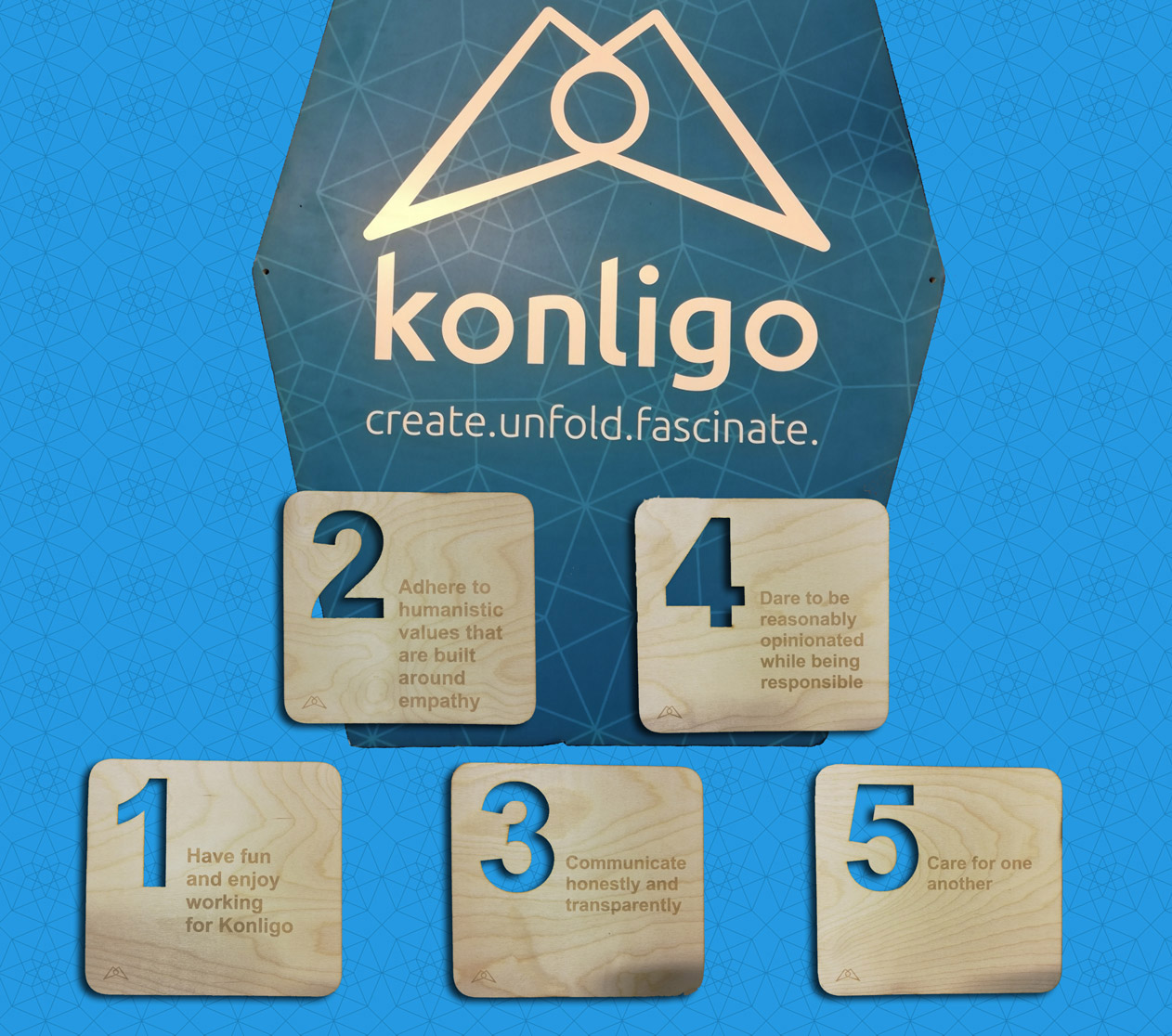
A sustainable business model?
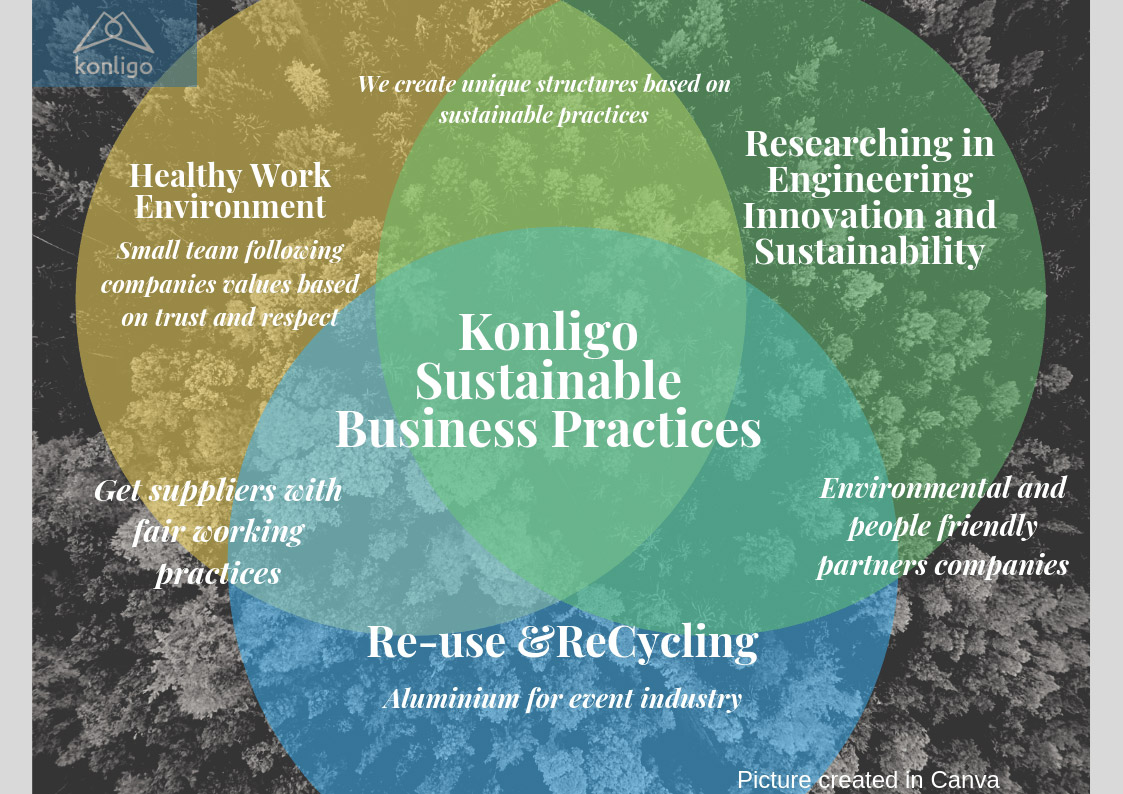
A sustainable business model?
If we start to think about it and look back at how business life has enormously evolved during the last two centuries, who would have thought that industrialization and its practices would get a bad image, and posteriorly the resulting consumerism and waste (like plastic o.a.) must find an end.
Industrialization helped in making our lives easier by increasing our agriculture production and feeding the fast-growing population. People were moving to the cities because men working in the fields were no longer needed. Then, plastic was created and its use increased extremely fast, easily becoming the replacement of other materials due to its ephemeral value.
At that time, people only saw short-term benefits and how life was becoming more practical and easier. Not only private daily life, but also businesses didn’t miss the opportunity to spread and use industrialized technologies and products.
People started to consume indiscriminately and consequently getting rid of stuff as they used it.
Looking towards change
Nowadays we are heading towards developing a long-term vision regarding our planet’s resources. We try to solve the problem before we create it. Indeed we cannot hide our problems on waste islands abandoned in the middle of the sea or dig it deep enough in the ground. Ideas are rapidly transforming as effective solutions: recycling? circular economy?
People are realizing the mess mankind has made and is still making. But actions are starting to rise and finally we can agree that sustainability is the new necessary trend, also in today’s business life.
New ways of doing business
Many companies from all around the world, particularly right after the agreement of Agenda 2030 for sustainable development, have started to modify their business practices and greening up. In fact, many new companies, and especially start-ups are born inspired by this boom. Even multinationals are adopting in a way it is now expected from them.
Being sustainable, is it a long-term necessity or a temporary trend? At least many theoreticians agree upon it and support it globally. There are plenty of benefits linked to sustainability, such as tax reduction, a fact that can be quite interesting for many companies due to the immediate benefit that it will provide them.
As things will change there are many possibilities in improving the working atmosphere and workplaces. Getting sustainable supplies, water filters, plants and recycling in a proper way will have a positive effect on the working conditions and wellbeing of employees. But a step ahead – and maybe even a must - is creating jobs and companies or organizations fully based on the sustainability and circular economy concept.
The media’s role in shaping today’s business
As the media becomes more and more powerful, so does the public opinion as well. Because of this, many companies try to catch people’s attention by proudly showing off with their “greenness”. Everything can be highlighted: using recycled materials, non-testing on animals, giving up plastic and so on. This is actually a positive side effect of a sustainable business model, but sustainability cannot be addressed only for marketing purposes and we all should be careful about misleading greenwashing activities.
Konligo’s mindset regarding sustainability
When it comes down to launching in an entrepreneurial adventure and you are looking for a plan, it’s important that your vision must be linked to what’s important to you and what the world – today and in the future – needs. Many people agree: doing business is all about generating and seizing opportunities. Konligo saw an opportunity to promote its innovative technology in the event industry due to the huge amount of waste generation. In addition to this, while Konligo’s team is growing, people are being carefully selected not only by choosing professionals and experts but also for their particular mindset and values regarding sustainability and environmental issues.
The circular economy concept is a business model reference at Konligo. Circularity reminds us that with every purchase comes a certain reaction and consequence in nature. Every natural cycle has a beginning and renewal ending (from cradle to cradle), but is this really happening with the majority of the products that we own or buy? Not yet! Most of those have a linear cycle (from cradle to grave): after being produced and used – generally in a short lifespan - they end up on the waste pile, polluting our grounds, water, and oceans.
At Konligo, we certainly believe that the model of circular economy should be adopted for many if not all. We aspire to reach sustainable expertise and develop a consequent image through designing structures from recycled materials, giving them a circular life where they can become functional again.
Happiness is overrated. Really? I don’t think so
I heard that quote when discussing with friends about one of my favourite topics, happiness. It was a reaction to me saying that everyone on earth wants to be happy, a statement I truly believe.
This reply made me understand that happiness is an umbrella term and that people define it very differently.
My definition of happiness
Happiness is for me a state of mind, it cannot be correlated to the immediate feel good moments that you have when being tipsy, when buying a new car or when receiving money.
And that’s the main difficulty. We as humans are mainly focused on immediate satisfaction instead of on the long-term effect. Why? Because long-term benefits are almost impossible to measure. Buying a new car is something tangible, making it therefore easy to think that it could make you happy. Studies, like the 1978 study by the psychologist Philip Brickman, have shown, however, that tangibles things don’t have any influence on your long-term happiness level.
Of course you can have a big failure at work, you can lose something or someone very important, and that’ll make you angry, sad or you will feel hurt. But that’s a temporary feeling, at the end, your happiness level should not be affected.
Be positive
Reaching happiness is for everyone different. There’s no perfect recipe that one can follow to be happy.
In my case, the most important aspect is to have a positive mindset.
Happiness is a state of mind, therefore, if your mind is focused on the positive aspects of every situation you encounter, you will not be distracted by negative thoughts that could bring you down.
This is a difficult mental exercise. We tend to victimise easily, think negatively, blame others, because as a matter of fact, this is the most easy path for your brain.
But you need to build a new path in your brain, and make of this path a highway.
I’m practising “positive thinking” for more than 5 years now and the results are great. Like every exercise, the more you practice, the easier it becomes. You begin to see the world in a more positive way, you are more optimistic about your life and the world, you dare to deal with every difficult situations, etc.
One of the best result I had with being positive is that I now see every problem in my professional and personal life as a challenge to learn and to grow. So I don’t say “I’ve a problem”, I say “I’ve an exciting challenge”.
But that’s not all
Being positive is the first step but not the only one. I also feel the need to work on the following aspects in order to be truly happy, and being positive helps in maintaining these aspects alive and kicking.
- Love of family and friends. You need people that are close to you. People with whom you can be yourself, with whom you can share your funniest and saddest moments, your ambitions and your fears, your successes and your failures. Friends that “can look right through you and still enjoy the view” (quote derived from the book QBQ by John Miller).
- Fulfilment. At work and at home, you need fulfilment. Every person can define fulfilment in his own way, but you need to think about it and work towards? it. In my case, I define fulfilment by being able to work on challenging projects where I can constantly learn and help others. In other words, I define it by my current personal growth potential and the way I can inspire others.
- You need to feel safe, on health and financial issues. If you are strongly suffering on these issues, it will absorb all your energy. Of course, you will struggle with these aspects in your life, but it’s important to work on them with a positive mindset.
- Helping others. The feeling of helping others is one of the best feelings you can have. It doesn’t necessary mean that you need to give money to people in need, it can be helping the old ladies with the groceries, keeping the door of the tram open for someone who wants to catch it, sharing your knowledge with newbies, etc. When your focus is not on yourself but on others, you will reach a very high level of satisfaction (more in one of my future articles).
Is happiness overrated? Well it depends on how you define it. If you define it as a pursuit of “constant feel good moments with no life troubles at all”, then yes. Overrated, impossible and frustrating.
If it’s defined as a state of mind based on a positive attitude, then it’s feasible and satisfying. If fact, you can call it like you want, it doesn’t matter. What matters the most is the understanding that these exercises could improve your wellbeing and your life satisfaction, and therefore, the life of the people around you.
I feared the corporate world, but I was wrong
So, I feared that I wouldn’t find my place in the business world. I feared that I would have to put my values – which are based on helping others, empathy and happiness – aside to fit in this corporate world. But I was wrong…
The new adventure
Until last year, I combined working in the academic world (Vrije Universiteit Brussel) with volunteering for my own non-profit organisation (Edukado). Both of those worlds aren’t focused on profit:
- At the Vrije Universiteit Brussel knowledge is being shared with the world for free, as a way to help science.
- At Edukado we are helping locals of developing countries and Belgian students to build their own educational project and have a blast.
So, when I started with Transformactive, my biggest fear was that I wouldn’t be able to do what motivates me: inspiring and helping others.
The corporate world is changing
I realised, however, that the corporate world is changing, that it doesn’t only focus on profit anymore.
Whereas in the beginning, our ancestors’ main job was to hunt to survive, many of us now have the luxury to work without constantly feeling the survival pressure.
Like always, evolution is playing a role. The management model of most of the big corporates comes from a model derived from the industrial revolution. And after the different world wars, our countries had suffered a lot and a very stiff and hierarchical corporate management model was necessary to build wealth as fast as possible.
But this model is collapsing. With the fourth industrial revolution going on, we now have the luxury to think about wellbeing, happiness, fulfilment, grow, etc. The companies that don’t take that into account, suffer from a high turnover. And that changes everything.
A positive change
More and more companies are focussing on their employees’ well-being in order to decrease the high level of turnover that many of them are facing. Google is a perfect example, with a different corporate culture where they have staff working on keeping all employees happy to maintain productivity.
New companies are even rising without vertical management anymore. A lot of small companies or start-ups, but also a specific department of 400 staff members at Engie-Electrabel to name one, are opting for the “TEAL-model”.
This TEAL-model was introduced by Frederic Laloux in his book Reinventing Organizations. His model focuses on self-management and on bringing “all of who we are” at work, instead of just our “professional” self.
In my future articles, I will go more deeply into the TEAL-model and on the powerful idea of “giving to others” as one of the best way to have a healthy company.
The idea that I had about the corporate world is therefore old-fashioned. With the new types of companies that are rising everywhere, I’m very optimistic about the changes that will take place in our world, switching from the old stiff corporate culture to a much more agile structure, with the employees’ wellbeing as one of the main goals. Off course, it’ll be challenging to apply these changes to big companies with lot of employees, but I’m very curious as I’m convinced that this is the future. To be followed…
Why accepting criticism is your way to success
Norman Vincent Peale
I’m sure you know the feeling when someone criticises your work: your ego is hurt, you get defensive — or even aggressive — and try to prove by all means that you were right.
Most of the time, you are even angry at that person and conclude that he did not understand what you meant.
I will not deny that accepting criticism is difficult. It is, however, one of the best way to grow. Indeed, even if compliments and praises provide you feel-good sensations and boost your ego, they are not really instructive.
Criticism, on the other hand, if constructive and truthful, provides you with very accurate feedback on mistakes you made. As commonly known, you learn the most from your mistakes, and facing criticism is the best way to understand those mistakes.
It takes guts to give constructive criticism
You should realise that if your good friends or acquaintances criticise your work, it is for your own good, as they don’t win anything by risking upsetting you.
These honest people are willing to tell you the truth, allowing you to grow, instead of merely praising you so that you will like them in return. Such people are rare, so if you find them, keep them close, as they will be very important for your personal growth.
Be aware that you will also meet people that may want to harm you, so it’s important that you filter the constructive criticism — even if given in a disagreeable way — and just don’t pay too much attention to the rest.
How to handle criticisms in 6 steps
- In my case, I always start from the mindset that the one who is criticising me is doing it with the best intentions.
- That’s an important attitude that will allow you to listen to the criticism, which is the second step. In order words, don’t react! Don’t start to argue. Just listen.
- The third step is to avoid taking everything that is told personally. This is a very difficult step, as it requires that you look at your work from an external point of view. This will help you to understand that the criticism is in fact not aimed at you, but at your work. Remember: your past work is done, you cannot change it anymore. However, you can improve it for the future, and as a matter of consequence improve yourself. The only way to do that is by accepting the added value of the criticism to your work.
- Next, understand this added value by asking questions about the criticism. This will show your critic that you value her opinion, which is important for future collaboration. Furthermore, it helps you to dig deeper and uncover ways to improve even further.
- The fifth step is a very important one: express your gratitude. The person providing you feedback is spending his time on you. You can learn and grow thanks to her, so thank her and mean it. She will appreciate it and feel at ease to do it more often.
- Finally, learn from it. You don’t have to accept all criticism, everyone has his or her own opinion and it’s up to you to decide what are the take-aways. However, by applying the previous steps, you will be able to drop your ego low enough to be (almost) objective about the criticism on your work.
The next time someone criticises your work, apply these 6 steps and pay attention to your feelings. You will notice that you will feel better once you deal with criticism in a calm and objective way. This will help you to reach the stage where you will gladly ask to be criticised without beating around the bush. Believe me, you will grow faster than you can ever imagine!
Let’s make effective New Year’s resolutions
If you’re like most of the people, it hasn’t been the first time you defined New Year’s resolutions, and it hasn’t been the first time you failed to keep these resolutions. Why is that?
Why wait for New Year’s Eve?
Let’s have a look at one of the main “criticisms” I hear about the New Year’s resolutions: why do you wait for New Year to make resolutions? Why should New Year be a “redefinition” of yourself?
Off course you shouldn’t ONLY wait for New Year’s Eve to define goals to be a better person, but let’s face it, it’s a very special day.
New Year is starting, friends and family are all gathered to celebrate that special moment, so why can’t we use that magical moment as a motivation and inspirational source to be a better/healthier/happier person? Why is this a problem?
Aren’t you happy like you are now? Well yes, I am, but there are always things to improve. We, human, can always grow, that’s what makes it so beautiful, so interesting.
Don’t make it too general
Most of the New Year’s resolutions are too general. By defining a too general topic, you don’t explain and think about how you could achieve your resolution. Take the example of “I want to read more”. What does that mean? What is more? How do you plan to read more?
A better way therefore to define a New Year’s resolution would be to be specific and define short milestones that will provide you a quick feedback on how you are doing.
In my example, you could say: I want to read 20 books a year, starting with 1 book the first 4 months and from then on 2 books a month. You can go further and make a list of the first 5 books you want to read, and define how much “pages” you want to read per week.
By being very specific, you take the most crucial step people fail to do: you plan your resolution.
Be realistic and not too optimistic
Many of the resolutions are way too optimistic. So whatever you want, make sure it doesn’t ask too much effort from you, otherwise you will not be able to do it a year long.
If you love spending time on YouTube and hate reading, then don’t t make the resolution of reading more. Instead, think about why you want to read more: is it because you want to learn more about human psychology?
Your resolution could then be: “Viewing more instructive YouTube videos on human psychology”. The result would be the same, but you wouldn’t force yourself to do something you hate, and that’s a more realistic resolution.
Finally, if you plan your resolution, you can quickly estimate if your resolution is feasible and be less optimistic if it isn’t the case.
My take home message of this week: there’s nothing wrong to use the magical moment of New Year to define new resolutions. Make them, however, realistic and very specific, and try to already plan how you would realise them by defining short milestones (and treat yourself each time you reach your milestones! 😊).
Let them do the scoring
In his great book “Good to Great”, Jim Collins uses a metaphor that says leaders should get the right people in the right seats on the bus. Personally, I prefer the metaphor of a team sport instead of a bus, because in a bus, the seat that you choose doesn’t really matter (except if you’re the driver). I’m playing basketball since that I’m 12, so let me use that as an example.
The point guard (PG) leads the game
In basketball, the PG’s job is to run the team’s offence by making sure that the players are in their right position. He/she should distribute the ball to his/her teammates at the right time so that THEY can score. Sometimes, the PG scores too, but it’s mainly the teammates that should score while he/she is giving the assists.
That’s exactly your job as a leader. You must find the right teammates, put them in the positions where they excel and give them enough opportunities to score. Let them do the scoring. It’s not about you, it’s about your team.
The players trust each other completely

The opponent is winning 79-78, you have the ball and you look at the timer: 5 seconds left! You dribble, the defence is tight, but you could go through. However, on the other side is Fred, and he stands free! You don’t think twice about your choice: you pass the ball; Fred scores and your team wins the game.
Well that’s trust. You trust your teammates completely and that’s what makes your team better than other teams. So why don’t we trust when it’s about business? Why do we want to keep the merits for ourselves? Let’s have the same faith in our colleagues as we have in our teammates.
Individuals are needed to have a team
Even if it’s a team sport, when Quentin has the ball, he keeps calm and doesn’t pass the ball immediately back to “the team”, he takes responsibilities. If he misses his shot, he also doesn’t blame the team. He takes responsibilities and defends two times better to take the ball back.
Taking your responsibilities and being pro-active is very important in business, because hiding behind the excuse of the “team” doesn’t help anyone.
At the end, it’s for fun
Even if you are playing to win, at the end, you play for fun. If Jason doesn’t like to play in our team, he will quit playing and leave the team. The only reason for him to stay is because he loves the team spirit, and that’s what makes a team strong.
You need to love what you do and share the same core-values with your colleagues, otherwise you will not be able to unlock the potential of your business.

Remembering all of this, the key to be a good leader is not to score but to help others score. And if you can add the fun part to it, you are running your business as a team sport, building a great foundation for a successful business.
What if I trusted more ?
Imagine yourself not trusting your parents from the moment you were a newborn. Doubting everything you hear or see, spending a huge time to verify if they are trying to screw you, gossiping about them with your siblings. How slow would you have learned and grown?
Well, that’s what is happening around us. The lack of trust causes loss of time, hypocrisy, and indifference.
Loss of time explained with the tragedy of the commons

The tragedy of the commons is a concept that explains why people acting in their own self-interest are disturbing a system that could otherwise work in everyone’s advantage.
Let’s use a hypothetical experience derived from the book of Dan Ariely “Predictably irrational”.
Image I give you and three other friends (Harry, Ron, Luna) 10€. I give you, however, the options to earn more. You can all secretly choose how much of this money you put in a common fund, and I will double that amount and divide it equally amongst the four of you. You decide to put the 10€ in the fund, thinking that if everyone does the same (40€), you will get 20€ (80€/4). You get however 15€ and not 20€. Indeed, Ron did not trust the group and did not put any money in the fund. The result was 30€ in the fund (x2 / 4 participants = 15€)
What will happen the next time you put money in such a fund? You will reduce the bet. And if someone is still putting less money than you, you will reduce your bet again, and again, and again. Until no one puts any money anymore, and you are left with your 10€, instead of 20€ if everyone trusted each other.
This simple example shows how mistrust does not help anyone. Mistrust in a company makes people spending more time controlling others and checking if what they say is true, rather than focussing on the mission of the company.
A lack of open and transparent communication causes hypocrisy
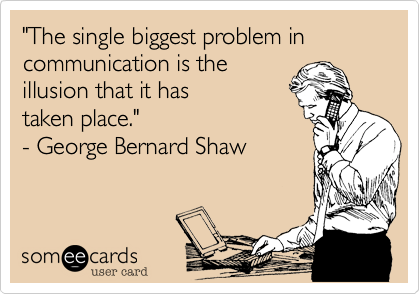
Trust is difficult to obtain in every relationship (professional or personal). A lot of companies consider trust as being a core value, however, to trust, you need much more than just this word on a paper.
You need to work on it, and one of the aspects you need to work on is the creation of an open and transparent communication atmosphere where people can be their own.
It doesn’t start with THEM, it starts with YOU. If you are open and transparent to others, speak out your mind in a constructive way, do not blame people for making mistakes, they will tend to do the same.
Note, however, that you can only establish this culture if you can yourself accept constructive criticism.
Take the example that you defend this value but that when your colleague Cho explains you what you did wrong you act very defensively, you will lose her trust, as you are not consistent. Furthermore, she, and other colleagues, will stop being honest with you and will start gossiping. And gossips are like a cancer in your company. They will act like nothing is wrong, but nothing could be less true.
Being indifferent to others will not help improving the trust issue
Often forgotten, however important, being empathetic increases the trust of people. Empathy is the ability to share someone else’s feelings. One of the best ways to do that, is trying to put on their shoes. This is, however, only possible if you ask enough questions to fully understand what they are going through (ask open-ended questions: https://www.wikihow.com/Ask-Open-Ended-Questions).
It helps you understand their choices and shows them that you care for them. It does not only improve the relationship and communication between you both, it also improves the mutual trust. Indeed, you will not be suspicious anymore about this person as you tried to understand her on his point of view.
To trust is not being naive
I don’t pretend that you should trust everyone. What I pretend, however, is that the relationships you have (professional or personal) should be based on people you trust.
In the case of your parents for example, of course, unconditional love is the reason of your trust, however, is this love really needed to trust? If you have the feeling that you cannot trust someone, even after being open and empathetic, then don’t lose time and remove this person from your circle of contacts. Focus on people that are worth it.

As a conclusion, I am not saying that I have the cure to mistrust, as this is a very complex issue that cannot be solved in one day. I’m just stating that being open, transparent and empathetic with your team would help to trust each other more. This trust could lead to a higher productivity. Meanwhile, remember that everything starts with you. Indeed, if you don’t trust others, how can you expect they trust you? So start by asking yourself this question: “what if I trusted more?”
Time is not money, time is much more valuable than money
“Take a minute to think about the most valuable things in life. If you are like most people, your list includes things such as family, friends, fitness and finances (money).
Now, how would you rank these things on your list? It might surprise you to discover that many of those who are considered highly successful all rank the same thing at number one: time.
Why do these people consider time to be such a valuable asset? Shouldn’t health be No. 1? Well, think about it: You can be healthy, and then get sick, and then regain your health.
How about money? You can lose all your money, and then you can make it all back.
Friends are important, and yet, how many friends did you have back in college that you no longer keep in touch with? Or even people who were guests at your wedding, and that was the last day you ever saw them? Yes, friends are prized, yet we lose them and make new ones all the time.
Your spouse might mean the world to you. And yet, 50% of married people get a divorce, and many divorced people find a new husband or wife that is suddenly the love of their life.
But time… You can never lose time and get it back again. You can’t spend time and go earn more of it. You can’t buy it, rent it, or borrow it. Use it wisely and enjoy the benefits. Squander it, and it’s gone forever.”
Kevin Kruse in 15 secrets successful people know about time management
Monday, 9 AM. First thing I do, I check my e-mails. I read all of them, answer to the ones I can answer quickly, leave the rest in my mailbox and I “unread” the most important ones.
Next thing, my to-do list: I try to find the things that can be quickly done. “Plan a meeting with Sam”. Nice, I send him a doodle and start the new task. What a nice feeling, I’ve removed 5 of the 19 to-dos! Meanwhile, I’m regularly checking my mails, I’m surfing on LinkedIn, checking messenger. Oh, time is flying! All the other to-dos are boring, I’ll do them tomorrow. “How was your weekend”? Oh, it’s Arwen, let’s chat. And… it’s 11 AM.
What’s wrong about this? Well, everything! Until a few weeks ago, I thought I was efficient as I could combine different professional tasks in a fast way. Oh how wrong I was. I still had so much to learn on time management (and still do as a matter of fact). Recently, by reading the book “15 secrets successful people know about time management by Kevin Kruse”, listening to various “Entreleadership” podcasts on Spotify and having some discussions with friends, I realised what is wrong with the picture I described above.
Let me tell you some efficient tips I learned these last few weeks:
Be a morning person

Even if there are theories saying that you should wake up late and start working late, I’m more convinced, in our society where school starts at 8 AM, that you should have a healthy morning routine as it will boost you and make you more efficient. Of course, the routine is different for every person, but this works for me:
- 6.30 – 6.40 : Waking up. Don’t snooze please, that’s not helping.
- 6.40 – 7.00: 15 minutes exercises. Exercises in the morning enhance your metabolism and improve your physical (of course!) but also your mental energy.
- 7.00 – 7.20 : Preparing breakfast and lunch. You can also prepare your lunch the day before if possible.
- 7.20 – 7.40 : Breakfast. Currently I’m losing a lot of time while eating my breakfast, because, pumped with energy, I start interesting discussions with my wife about all kinds of topics.
- 7.40 – 8.00: Prepare & leave. Finally, when my wife tells me I talk too much, I take my shower, get myself ready and leave for work.
Use your morning time wisely
Before anything else, when I arrive in the office, I take 15 minutes to plan my day:
- I try to avoid meetings in the morning.
- The activities where my full attention is needed are planned in the morning (R&D, working on mission statement & core values, budgets, etc.)
- The afternoon is for meetings, planning, mails, phone calls, etc.
Then I quickly check my inbox, without opening any mail, just to see if there is something urgent that would change my planning for the day (most of the time you can see it while reading the subject line). After that, it’s time to work!
Stop making a to-do list, start planning a to-do list
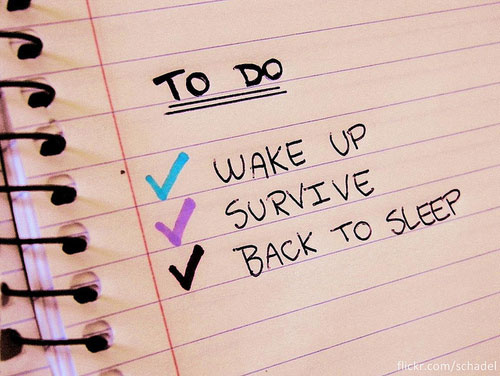
“I will add it to my to-do list”. Everyone has said or heard that often in his/her life. Do you know what the problem is with a to-do list? It is time independent. It means that you can have as many to-dos as you want in your list. What’s the result of that? You try to do some of them but never have time or motivation for all of them. In the meantime, you are stressed because you still have a never-ending list and you don’t know when you will be able to complete all these tasks.
Let’s change this!
- Start writing your to-dos as actions
- Plan them in your agenda as an actual event (I give my to-do events a specific purple colour, so I know it’s not a meeting but it’s a to-do). This provides me the opportunity to think about when can I work on this to-do, and how long it will take.
In conclusion, I do keep a to-do list when I’m not able to plan my to-dos, but every morning, I plan the to-dos in my agenda and then remove the items from my to-do list. No “damn I did not finish all my to-dos”, or “when will I able to do all that”.
Don’t be connected all the time
Checking your mails three times a day is enough. If it’s really that important, they will call, believe me. Do you have your phone constantly connected and are you getting notifications of mails, WhatsApp, messenger, etc.? Well remove automatic syncing, or keep your phone on silent mode and face down on your table.
I keep the sound for phone calls, but mute the rest. In that way, I can still hear the phone calls, but all the other things can wait until I want to check my phone during a break. And in the meantime, I’m not disturbed during my work and can really focus and work efficiently.
The mail routine
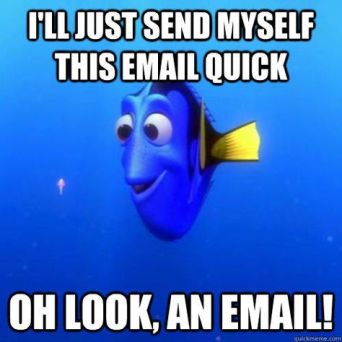
First, try to avoid sending mails. It costs you more time to type than to talk. And even if you sent the e-mail, you will waste much more time than if you had called. Conclusion: call if possible, you’ll love it.
When mail is the best option, I have a very specific mail routine that helps me keep track of this communication tool that has lost all its effectiveness.
- All team discussions are not done by mail but through Slack. I refuse to send (and receive) mails from my team members, except if they really need to put me in CC. Slack, if well organised, is a great tool to communicate. If we need to discuss a mail someone received, we transfer that mail to slack and discuss it there.
- If you read, you act. Once you open a mail, don’t “unread” it again, act immediately! You lose a lot of time when you read a mail, do nothing, and read it again a few hours later. Why did you read it for the first time? How did that help you?
- How do you act? You reply, or you plan it to in your agenda and you delete/archive/file it. If you need to do some work first before being able to answer it, then plan that task in your agenda, and move the mail to an agenda item so that you plan a reply.
- Empty your inbox! The feeling of an empty inbox is priceless. So, after replying or planning your mail, file it into a folder.
- Follow your sent items. How often do you send a mail, and forgot that you were waiting for a reply? And by the time you realise that, it’s already too late. What I do, in order not to fill my to do list with follow-up e-mails, I put my important sent mail in a folder (“TO FOLLOW”) where I’ve added a conditional formatting that highlights the mails in red if they are older than x days, for example 5 days (https://www.datanumen.com/blogs/auto-highlight-outlook-emails-based-ages/) . Every day, after lunch, I check this folder and send a reminder for all mails that are in red. Or I call.
Feel free when you go home
At the end of my day, I take 15 minutes to reflect on the day and do following last things.
- I empty my mailbox
- I plan my following day
- And I also try to plan the rest of the week, but by keeping buffers to be able to add things (meetings, tasks, etc.) when necessary.
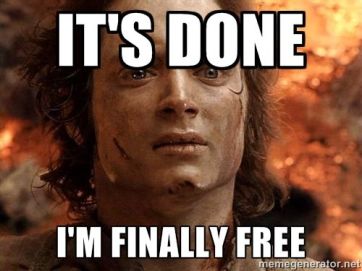
Planning a to do list in your calendar, neglecting your smartphone while working, avoiding sending mails and replying to mails in a structured way (without spending too much time on it) are just a few of the tips that could enhance your productivity. Don’t forget, however, that you should stay true to yourself and try to find a ritual where you feel comfortable. In the end, it’s all about avoiding losing time on unnecessary things so that you can focus on what matters the most: your business but also family and friends. And that’s so much more valuable than money.









